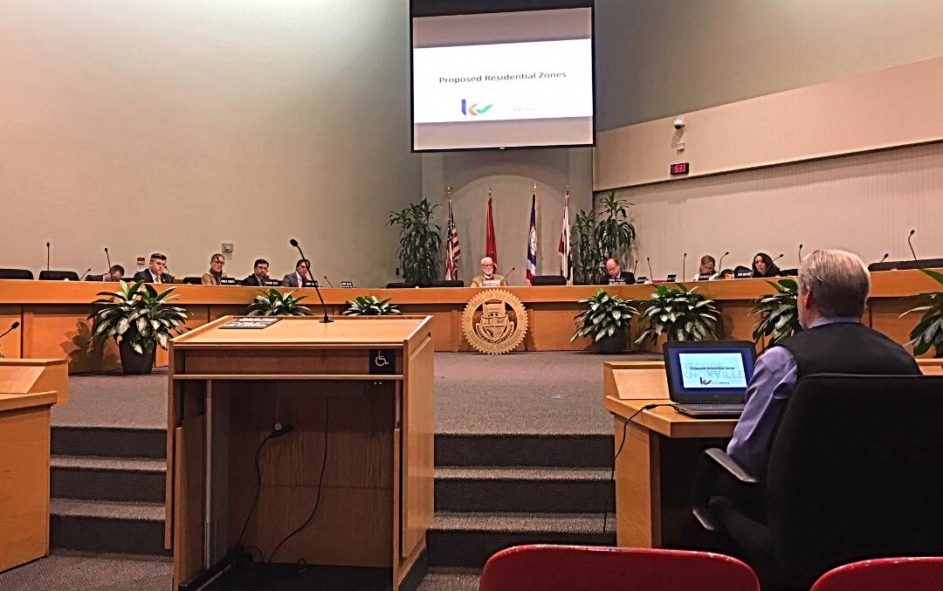Last week’s City Council workshop slogged on about residential code topics for some 3 1/2 hours, without final resolution. A number of individual suggestions were made but not resolved. (There is no voting at a workshop, although a straw poll to see how folks are leaning is permissible). Main topics, including accessory dwelling units and other small buildings, standards for home occupations, the need for off-street parking, alley access in inner-city areas, and residential density/zone designation, dominated the discussion.
Only a modest handful of citizens lasted till the end of the marathon. By 9 p.m. it was obvious that Knoxville-Knox County Planning (formerly MPC) had punted this half-baked Recode ball to the council on third down. Their “final” draft wasn’t close to field-goal range. Hopefully, City Council seems committed to find a way to fix what’s broken.
Schedule. Vice Mayor Finbarr Saunders said a third council workshop will be scheduled for late March or early April. The actual date is somewhat dependent on when Knox Planning revises the current working draft. Meanwhile, council discussed the need to employ a more efficient method to resolve and document possible solutions to disputed issues, as they continue to wrestle chapter by chapter through Recode. A chapter-by-chapter (even section-by-section) mark-up was used several years ago in order to work through the controversial sign code before it was ready for a formal vote. Let’s hope they continue to realize the importance of getting this right.
Highlights. Some progress was made. Hopefully, that will be reflected in the promised fifth and presumably “final working draft,” due sometime in mid-March. It was obvious that some of the existing standards (such as defining permissible limits on home occupations) and other potential neighborhood disruptive intrusions need particularized attention.
Several council members asserted that “one size does not fit all neighborhoods” and a further review of requirements, like those for off-street parking, needs more tailored treatment. There is still work to be done.
Serial Fixes? Council member Stephanie Welch suggested that the Stakeholder Advisory Committee, previously appointed by Mayor Madeline Rogero to work with Knox Planning, be continued and tasked with meeting quarterly over the next two years to address problems that arise under Recode. Council member Andrew Roberto, who aired changes needed in the text, agreed. Interesting at first blush. But one wonders. Pass now, fix later is dicey when you realize that things built in the interim are protected under the state grandfather law. More importantly, it is unclear whether such conscripted advisers will hang in that long. Nearly a third of those members did not attend prior advisory meetings. Burnout often sets in on volunteer bodies.
Public Voices. Enough of officialdom. There were interesting public-forum comments from folks who stayed till the end of the workshop:
- Realtor Debbie Phillips pointed out that ADUs will inevitably change use once the aging parents or stay-at-home child (it was built for) are gone and will likely end up as rental units. Because there is difficulty obtaining financing for multi-family property when such property is sold, both the principal unit and the ADU will likely turn into rental properties (despite Recode’s “owner-must-live-on-the-premises” rule). Peter Ahrens of Plans Review & Inspections responded that the city would have no way to track that after the property has been sold.
- Homeowner Bonnie Jones urged the council to preserve the American dream of a single-family home with a fenced-in backyard. The current millennials will soon be settling down and raising families. They will need backyards for kids to play in, maybe a garden to putter in, and even a place to park the weekend RV. Don’t inadvertently “do away with suburban neighborhoods in the name of urbanism everywhere.”
- Cindy Johnson of West Hills suggested that council should not just dump the wisdom learned over the past 60 years. The existing code recognizes the “human factor” single-family neighborhoods provide, adding that we don’t need “to urbanize the whole city.”
- Bob Whetsel from 4th & Gill produced a color map illustrating that most of his neighborhood was restored to single-family residences years after this historic older neighborhood had undergone a tenement-reuse period, as it declined in popularity. His pioneer neighbors have since restored those once-rundown homes. The neighborhood has suggested to Planning executive director Gerald Green several agreeable sites for adding duplexes and multi-family housing instead of wholesale mapping this neighborhood as an RN-4 zone. Whetsel added a concern that the last draft reduced the lot size for duplexes in RN-2 to 7,000 sq. ft., threatening further disruptive development.
- Attorney David Hamilton from the Norwood area blasted the council’s slow pace debating seemingly obvious issues like inside home offices (e.g., you can do what you want in your house; just don’t bother the neighbors). He asserted the city is just changing zoning to raise more tax money. Instead, he urged council not to impose artificial density requirements or to “change the way we live in our modest community.”
- Ron Davis from Skyline Drive said many in the black community are renters, and the council should be careful not to inadvertently impact renters and other vulnerable people. Davis asserted that zoning has sometimes been used to segregate people. That should be avoided.
- Larry Silverstein of Community Forum, a group representing a dozen neighborhoods that have submitted detailed suggestions and corrections to City Council, urged council members not to change portions of the existing code that are working. He said council should have a clear rationale for any changes it does make.
- Joyce Feld of Scenic Knoxville urged the council to restore the basic architectural design standards for single-family homes, which had been included in an earlier Recode draft. Such architectural features preserve a community’s character and history – that’s what “makes a house a home.”
Future Steps. Review the next Recode draft due out in mid-March. Write to or call your council member. The people need to be heard!

